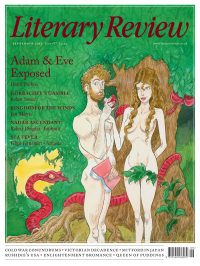Wizards & Werewolves
The Explorer
By Katherine Rundell
Bloomsbury 416pp £12.99
Katherine Rundell’s jewel-like fourth novel, The Explorer, riffs on Willard Price’s Adventure series, with a dash of William Golding’s Lord of the Flies. It concerns a group of children whose plane crashes in the Amazon jungle. Torn from their safe world of cricket jumpers and Latin prep, they must contend with hunger, insects that might be deadly and the challenge of finding their way back tocivilisation in Manaus with only a raft and a very damp map.
The explorer of the title is in fact not really an explorer at all but a man who, captivated by wilderness and the ancient, terrible beauty of a lost city, does not wish the rest of the world to find it. This is a subtle and intelligent way of addressing the ecological and cultural consequences of exploration. There is something here, too, of Rousseau’s natural man, at one with his surroundings and at ease with all that comes to him.
The pace is as swift as a swimming caiman, and there are some thrilling set pieces; the characters are sparky and well observed, and they must contend with creatures both scary and sweet, including a delightful pet sloth. Rundell’s gift for apt description and bons mots is on full display: ‘You should always dress as if you might be going to the jungle,’ says the explorer. ‘You never know when you might meet an adventure.’ These are certainly words to live by. At the end, you’ll want to join her characters in the Ritz to eat its entire supply of cakes.
The Wizards of Once
By Cressida Cowell
Hodder Children’s Books 384pp £12.99
Following swiftly on the heels of her wonderful, gazillion-selling How to Train Your Dragon series comes Cressida Cowell’s new book, The Wizards of Once, which is just as full of delights and quirks, set in a ‘British Isles so old it did not know it was the British Isles yet’, where ‘magic lived in the dark forests’. There are two opposing tribes, composed of the Wizards, who are powerful yet somewhat incompetent, and the Warriors, who apparently lack magic and instead use the terrible power of iron.
Cowell has a natural gift for things that appeal to children: I particularly enjoyed the entourages that surround every Wizard, one of which contains our hero, Xar, who has ‘a great deal of personal charisma’ and comes with ‘a pack of five wolves, three Snowcats, a Bear, eight sprites, an enormous Giant called Crusher, and a small crowd of other Wizard youngsters’. He’s up against the brave, intelligent, eye-patch-wearing Wish, daughter of the Warrior queen, and must also steel himself for the potential return of the Witches, strange, black-feathered beings that bring the cold of death wherever they go.
The excitements are balanced with jokes: the princess’s bodyguard, for example, has a condition that means he faints at any sign of danger. Overall, it’s a zany, gripping and spiffingly good story about finding your own place in the world and facing up to problems bigger than you.
Curse of the Werewolf Boy
By Chris Priestley
Bloomsbury 256pp £6.99
Chris Priestley is one of the most versatile children’s authors writing today: I have in these pages reviewed several of his dark horror stories over the years, as well as his metatextual versions of classic novels. His elegance is unfailing. Curse of the Werewolf Boy is for younger children, and it’s a chronologically complex joy. Maudlin Towers is the kind of school that Molesworth might have attended, full of leaking ceilings, prowling masters and terrible food. It also happens to have a physics teacher who tinkers with a time machine. The plot is fantastically well controlled. It begins with a Viking who has found his way into the ha-ha, and the theft of the school spoon (apparently given to the school’s founder by the Duke of Wellington himself). We meet a suspiciously fluent new female Latin mistress and a werewolf. The tension is ratcheted up with a threat to ban the Christmas holidays. The absurdities of time-travel fiction are breezily and cleverly handled, and there is a delightful cameo from Literary Review cover artist Chris Riddell, who pops up as an art teacher. Priestley’s illustrations recall Ronald Searle at his best.
Behowl the Moon
By Erin Nelsen Parekh
Drivel and Drool 22pp £8.99
Erin Nelsen Parekh’s Behowl the Moon takes Puck’s final speech from A Midsummer Night’s Dream and lays it out in an accessible format, with eerie illustrations by Mehrdokht Amini that bring donkeys, lions and fairies together in frolicsome fashion. It’s a wonderful way to introduce Shakespeare’s work to children in their earliest years, with its dreams, play-acting and enchantment. I hope that it will herald a series.
To order Behowl the Moon, visit www.drivelanddrool.com

Sign Up to our newsletter
Receive free articles, highlights from the archive, news, details of prizes, and much more.@Lit_Review
Follow Literary Review on Twitter
Twitter Feed
In the 1830s, the Baltic city of Königsberg was scandalised by a lascivious pastor, accused of encouraging such extreme sexual acts that two young congregants died from arousal.
John Banville looks at 19th-century Germany’s answer to the hot priest.
John Banville - Fall from Grace
John Banville: Fall from Grace - A Scandal in Königsberg, 1835–1842 by Christopher Clark
literaryreview.co.uk
A compelling story of a car crash and a family holiday set amidst omnipresent technological development. In this month's @Lit_Review I reviewed @bruceholsinger latest novel Culpability @EuropaEditions
Oscar Tapper - Dead Ahead
Oscar Tapper: Dead Ahead - Culpability by Bruce Holsinger
literaryreview.co.uk
Delighted by Ian Ellison’s @Lit_Review review of The Glass Mountain. “Gaskill’s painstaking efforts reveal some of the troubled person. In this rich, engrossing book he succeeds in his aim of writing ‘a story that in good conscience feels true’.”
https://literaryreview.co.uk/prisoners-progress